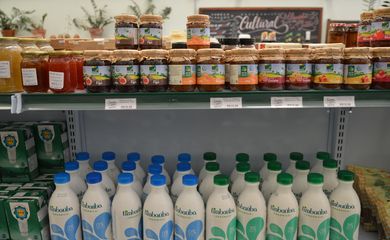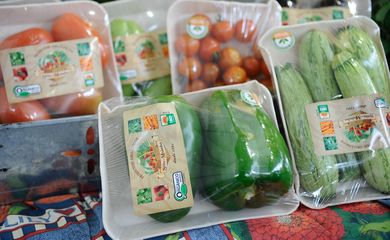Brazil executives show increasing interest in healthy food and drinks
On the rise despite the economic turbulence seen both regionally and globally, the health food market has drawn the attention of a large number of Brazilian executives. While some companies are founded with the aim of providing foods free of sugar and preservatives, others adapt and seek to meet the new needs presented by consumers. The demand is to be found in both domestic and foreign markets. Exporting typically Brazilian goods—with the value added of items certified as health food—is good business.

In a report published by research agency Technavio, the health food market is to expected increase six percent a year until 2020 worldwide. For Brazil, Euromonitor International estimated a four percent growth in this market until 2021. Business owner and former chef Matheus Mariani started getting involved in the field selling in the Brazilian market. In 2016, after three years of product development, he founded Alquimia da Saúde, a factory of dietary supplements free of chemical additives.
“I’ve worked as an event promoter and restaurant owner, but then I realized the need for people to eat better and in a practical manner. My brother-in-law was a mountain biker and would always ask me to develop something for him—natural supplements, no chemicals, no refining. So I started doing it, rather informally at first,” he said.
The idea proved successful, however, and led to the foundation of the factory now headquartered in Itajaí, Santa Catarina state. Mariani explains that his gastronomy degree and his experience as a chef at renowned restaurants in Europe helped him design the products, among then vitamins in capsules, powders, and essential oils. A special manufacturing process makes it possible to do away with additives.
“A technique named spray dryer allows you to microencapsulate a product, but you need maltodextrin, an additive that’s a carb and removes all the fiber. We do it differently Açaí, for instance, a fatty fruit, needs an additive in order to dehydrate. But we make use of a process called freeze-drying, which is ultra-freezing that dehydrates, [with no additives],” he said. Supplements from Alquimia da Saúde are sold countrywide, he said.
Exports on the horizon
“We’ve started with e-commerce, directed at natural persons. Now, natural product stores started contacting us,” he said. Mariani and Maurício Danilo Mariani, his father and investing partner, also decided it is time to export. Along with 61 other Brazilian companies, this week, they are attending the business rounds at LAC Flavors, a food and beverages fair organized by the Inter-American Development Bank IDB, in Santiago, Chile.
“The trend in Brazil is everything fine, everything sifted. Other countries saw the importance of fiber, of whole foods, a long time ago, way before us,” Mariani argued. At the fair, his company will hold a round of business with prospective buyers from Chile, Australia, Asia, and the US. The participation of Brazilian firms was made possible by the Brazilian Trade and Investment Promotion Agency, Apex-Brasil, which set up a stand to showcase products from Brazil.
Matheus Mariani believes in a market increasingly more favorable to natural products and lower prices. “We are the co-creators of expensive [organic goods]. The more we consume them, the more the volume of products available will increase and become cheaper.”
Adaptation
The increasing interest in healthier products also lead companies to adapt. That is very much the case with drink manufacturer Refrix, from the city of Tietê, São Paulo. In the market for 45 years with the soft drinks known as Xereta, the firm set about diversifying its portfolio eight years ago, after market surveys indicated a bigger concerns over health.
The company entered the health food market with coconut water Vittal, advertised as preservative-free. According to Daniela Echeverri Fierro, in charge of Refrix exports, the product comes straight from the fruit collected in the Northeast. It is pasteurized—meaning it is warmed up to high temperatures—which ensures conservation for about a year. In October, the company will launch its second natural product: canned teas, sugar- and additive-free.
Refrix, however, is still trading its soda. “Our soft drink has been among the recipients of the Best Flavors of Brazil award in two years,” Fierro said, proudly. The company has been active overseas for years, with exports in Paraguay, Uruguay, the French Guiana, the US, Japan, the UK, Portugal, and Germany.
With its participation in the business rounds at LAC Flavours, the company plans to expand the range of its international partners. Exports are part of the company’s growth strategy, and the health food line stands out in advertisement abroad, Fierro said. “We’ve been exporting since before the [economic crisis in Brazil] broke out. The market has shrunk, and our company has been on the rise. We’ve managed to challenge the crisis as we are always on the lookout for new business.”
Sustainability in the production chain
Founded six years ago, Manaos Polpas, a business based in the metropolitan region of Manaus, Amazonas, is also confident in consumers’ predilection for less industrialized goods. The firm sells açaí and the pulp of other typically Brazilian fruits, like the cupuaçu and the bacuri. Goods are purchased by supermarkets even in São Paulo.
“It’s a market that’s seen a lot of growth recently,” said Renato Freitas, the company’s trade director. “Our lives are tremendously busy, so it’s better if you can consume in a healthier and more practical way,” Leís Batista, relations director, added.
The company has been preparing the terrain for future exports. At LAC Flavors, business rounds have been slated with the company in Mexico, Uruguay, the US, Spain, India, Czech Republic, and Chile. Leís Batista argues there is considerable interest in Brazilian fruits. “Brazil’s fruit diversity is really rich and exotic.” He believes, however, that beyond the concerns over the product itself, the company’s commitment with the production chain as a whole is key.
“Açaí extraction is a case in point. Whether the people extracting it are being justly paid or exploited. If they can select the fruit appropriately and clean it, it can hit the market in 24 hours. Above all, whether the forest will be kept standing there—that’s key. We are looking to get quality certificates,” said Batista, who thinks it makes a significant difference in the international market.
*Reporter Mariana Branco traveled at the invitation of Apex-Brasil.






